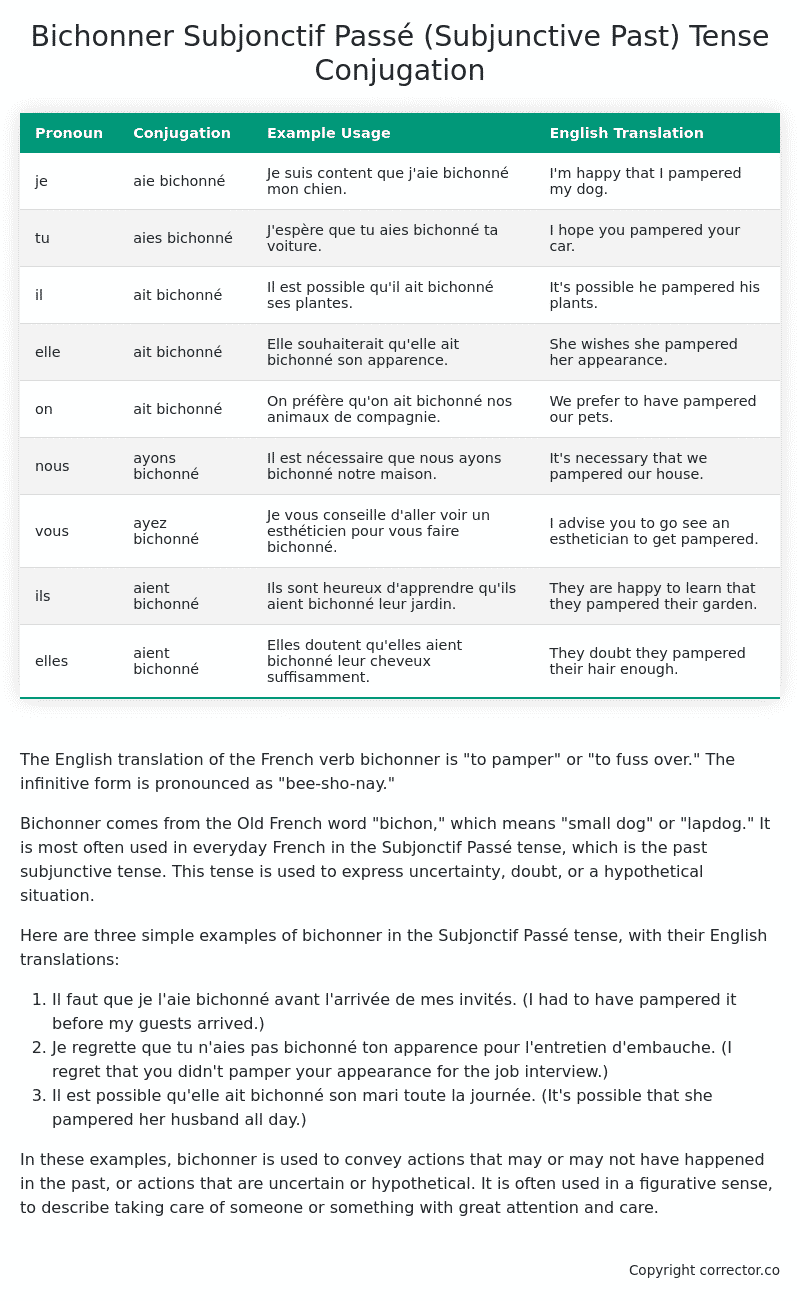Subjonctif Passé (Subjunctive Past) Tense Conjugation of the French Verb bichonner
Introduction to the verb bichonner
The English translation of the French verb bichonner is “to pamper” or “to fuss over.” The infinitive form is pronounced as “bee-sho-nay.”
Bichonner comes from the Old French word “bichon,” which means “small dog” or “lapdog.” It is most often used in everyday French in the Subjonctif Passé tense, which is the past subjunctive tense. This tense is used to express uncertainty, doubt, or a hypothetical situation.
Here are three simple examples of bichonner in the Subjonctif Passé tense, with their English translations:
- Il faut que je l’aie bichonné avant l’arrivée de mes invités. (I had to have pampered it before my guests arrived.)
- Je regrette que tu n’aies pas bichonné ton apparence pour l’entretien d’embauche. (I regret that you didn’t pamper your appearance for the job interview.)
- Il est possible qu’elle ait bichonné son mari toute la journée. (It’s possible that she pampered her husband all day.)
In these examples, bichonner is used to convey actions that may or may not have happened in the past, or actions that are uncertain or hypothetical. It is often used in a figurative sense, to describe taking care of someone or something with great attention and care.
Table of the Subjonctif Passé (Subjunctive Past) Tense Conjugation of bichonner
| Pronoun | Conjugation | Example Usage | English Translation |
|---|---|---|---|
| je | aie bichonné | Je suis content que j’aie bichonné mon chien. | I’m happy that I pampered my dog. |
| tu | aies bichonné | J’espère que tu aies bichonné ta voiture. | I hope you pampered your car. |
| il | ait bichonné | Il est possible qu’il ait bichonné ses plantes. | It’s possible he pampered his plants. |
| elle | ait bichonné | Elle souhaiterait qu’elle ait bichonné son apparence. | She wishes she pampered her appearance. |
| on | ait bichonné | On préfère qu’on ait bichonné nos animaux de compagnie. | We prefer to have pampered our pets. |
| nous | ayons bichonné | Il est nécessaire que nous ayons bichonné notre maison. | It’s necessary that we pampered our house. |
| vous | ayez bichonné | Je vous conseille d’aller voir un esthéticien pour vous faire bichonné. | I advise you to go see an esthetician to get pampered. |
| ils | aient bichonné | Ils sont heureux d’apprendre qu’ils aient bichonné leur jardin. | They are happy to learn that they pampered their garden. |
| elles | aient bichonné | Elles doutent qu’elles aient bichonné leur cheveux suffisamment. | They doubt they pampered their hair enough. |
Other Conjugations for Bichonner.
Le Present (Present Tense) Conjugation of the French Verb bichonner
Imparfait (Imperfect) Tense Conjugation of the French Verb bichonner
Passé Simple (Simple Past) Tense Conjugation of the French Verb bichonner
Passé Composé (Present Perfect) Tense Conjugation of the French Verb bichonner
Futur Simple (Simple Future) Tense Conjugation of the French Verb bichonner
Futur Proche (Near Future) Tense Conjugation of the French Verb bichonner
Plus-que-parfait (Pluperfect) Tense Conjugation of the French Verb bichonner
Passé Antérieur (Past Anterior) Tense Conjugation of the French Verb bichonner
Futur Antérieur (Future Anterior) Tense Conjugation of the French Verb bichonner
Subjonctif Présent (Subjunctive Present) Tense Conjugation of the French Verb bichonner
Subjonctif Passé (Subjunctive Past) Tense Conjugation of the French Verb bichonner (this article)
Subjonctif Imparfait (Subjunctive Imperfect) Tense Conjugation of the French Verb bichonner
Subjonctif Plus-que-parfait (Subjunctive Pluperfect) Tense Conjugation of the French Verb bichonner
Conditionnel Présent (Conditional Present) Tense Conjugation of the French Verb bichonner
Conditionnel Passé (Conditional Past) Tense Conjugation of the French Verb bichonner
L’impératif Présent (Imperative Present) Tense Conjugation of the French Verb bichonner
L’infinitif Présent (Infinitive Present) Tense Conjugation of the French Verb bichonner
Struggling with French verbs or the language in general? Why not use our free French Grammar Checker – no registration required!
Get a FREE Download Study Sheet of this Conjugation 🔥
Simply right click the image below, click “save image” and get your free reference for the bichonner Subjonctif Passé tense conjugation!

Bichonner – About the French Subjonctif Passé (Subjunctive Past) Tense
Formation of the Subjonctif Passé
Everyday Usage Patterns
Interactions with Other Tenses
Present tense
Future tense
Conditional
Summary
I hope you enjoyed this article on the verb bichonner. Still in a learning mood? Check out another TOTALLY random French verb conjugation!


